

Meet Angus Chan, one of our Psychology instructors! As an avid learner, Chan holds a Bachelor of Arts in Psychology as well as a Master of Education in Educational Psychology.
*The following interview has been edited for clarity and brevity.Q. Tell me a little about yourself.
My name is Angus Chan. I’m an educational psychologist by trade. I teach Psychology here at Alexander College and I work at Emily Carr in my day job doing Academic Quality Assurance.
Q. What is your hobby?
My hobbies include swimming, biking, and running, back in the younger days. I do more swimming now and spending time with my wife and son.
On the weekends we go out, we have a Science World Family Pass, we eat out and you know, he likes the driving range so we’re getting into that.
Q. What is a fun fact about yourself?
I was raised in Wales. Born in Hong Kong, raised in Wales, now living in Vancouver. From age 9 to 12, my mom sent me to a Welsh boarding school!
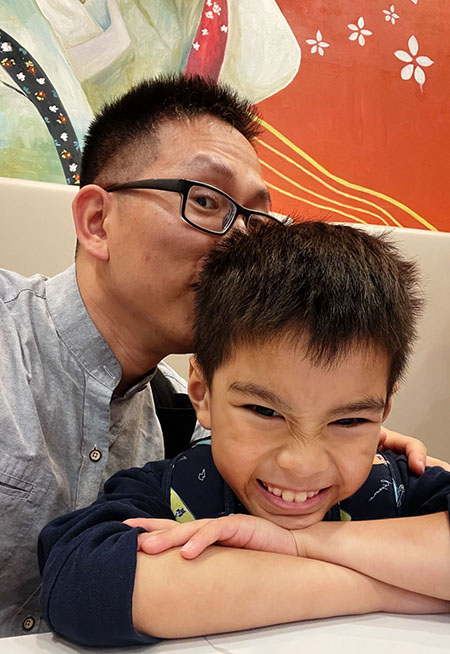
Q. What is your approach when it comes to teaching?
There’s a song lyric that I like to use and I can kind of base it on that in learning.
“In learning, you will teach, and in teaching, you will learn.”
When my class is there, even before, during, and after, there’s something always in it for me to learn and the goal remains the same.
My goal in teaching is that, my students, I’m here to help them learn. If I teach for three hours or one hour or whatever, and they don’t learn anything, I technically failed. Any methodology, any activity, any assignment that I give them is geared and designed towards helping them learn.
Q. What is the most rewarding thing about being an instructor?
I’ve seen it change in the stages of my journey of being an instructor. Even after 16 years of teaching, and maybe because of it, I’m still learning new and better ways to help students learn though teaching and training.
One of the things I haven’t changed for me is that I just want to help people. The reward is helping people and also seeing them learn.
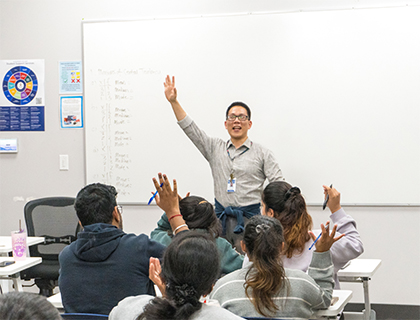
The biggest reward for me was when the students I tutored or taught become teachers themselves.
It doesn’t necessarily have to be what I taught them but, it is certainly more rewarding for me if I taught a student math and then they go on to teach others math. That is quite a touching moment for me.
Q. What can students expect in your class?
I think students can expect to work and learn.
I have a couple of these mini rhymes, if you will. “If it feels like one plus one, you know you can get it done.”
What that one means is, let’s say in math for example, or academic writing, which I’d argue are both based on skills and progression. Even if we are stuck on a particular skill in either math or writing, there is always a previous, or basic [foundational] skill we can trace back to – a learned skill that we already know how to do.
This is an issue of, let’s say academic preparedness. Students come in from various circumstances, and some might find themselves not yet prepared to take on multiple post-secondary classes, while also juggling other things such as work.
However, there must be something that they know how to do, even if it means typing on their fingers or thumbs, at least they know what they’re doing. It’s just to prepare them for it. So instead of two fingers typing, learn to type with ten.
Instead of doing one plus one, now let’s do the other operations. So then they build up to math or if they’re writing, they know how to answer questions. Well, let’s build on their journalistic questions.
‘Who’, ‘what’, ‘when’, ‘where’, ‘why’, and see the connection between those questions and the thesis statement and the supporting arguments. What they’re really asking is the ‘yes’ or ‘no’ and then ‘why’.
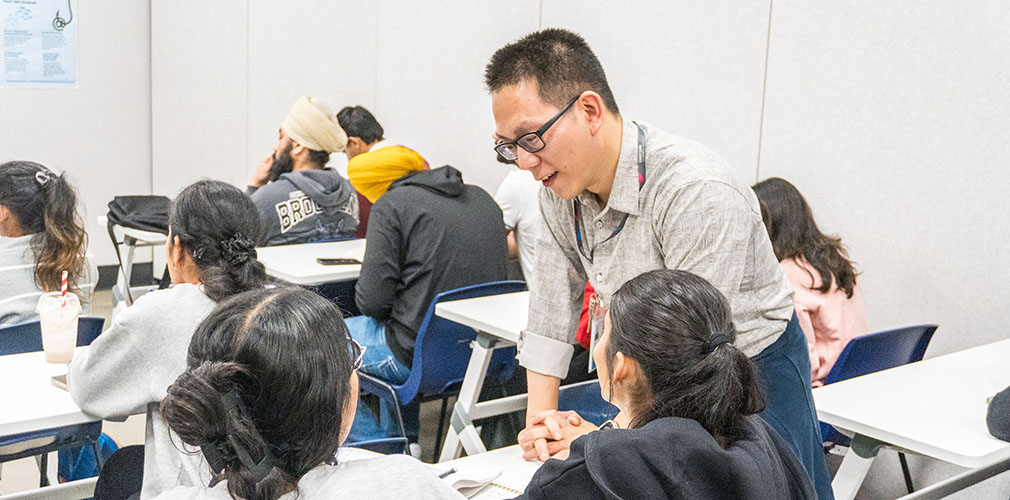
Q. What are some misconceptions students have about your subject and how do you address them?
I’ll break my particular subject down. The course I get to teach right now is Analysis of Behavioural Data (Statistics for Psychology).
It can be intimidating for some, the whole psychology thing, especially if they associate psychology with, let’s say, mind reading. Incidentally, that is one of the scarier superpowers because it’s not really about scale, strength, or speed.
Yes, other impressive superpowers can make you giant, strong, or fast, but being able to know what somebody else is thinking without their permission does feel wrong.
It’s like, why does that one person know about my secrets? That’s the fear of that power.
So if psychology is associated with, let’s say, mind reading or whatever, and it’s being abused that way, then of course, it’s scary.
Nevertheless, the working definition of psychology, as you probably know, is the scientific study of human mind and behavior, but it’s human psychology. It is trying to find out why and how people do things and Western psychology in particular doesn’t read minds, but they read things [data] that come out.
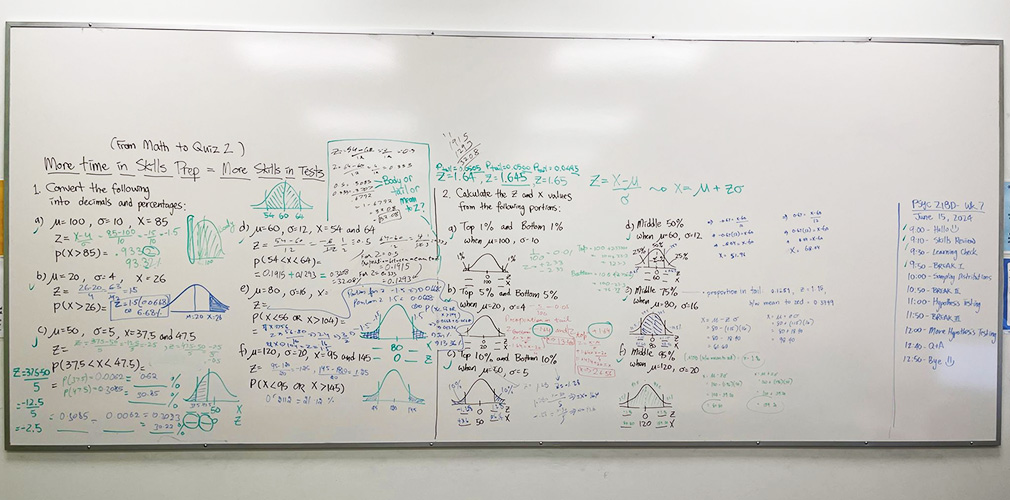
Q. If you could give advice to yourself when you were a student, what would it be?
A practical advice is something that I used to teach and “test” people. So I ask the question: how many hours are there in a week?
— Oh, I’m so bad at math.
That’s okay. There’s a bunch of responses I’m looking for. Number one, how you react to that question.
If I ask the question in a different way, let’s say, “Do you wish there’s more time in the week?” you’d say yes. The answer may surprise you.
The answer is, it’s impossible. Everyone gets the same amount of hours in the week. The math is 24 times seven. The math isn’t really the point, but the approach to it is the point. Instead of counting days or weeks, we’re more precise, we’re counting the hours.
Every day you skip is 24 hours skipped. Every week you skip is 168 hours skipped for seven days. I know it sounds very minute and very nitpicky, but it certainly helped me through the hours.

One concrete example, for all of us, anyone that’s working, look at your work schedule. If you work and study, you put in your work hours on your calendar, right?
Those are things you committed to do, but studying not in class time – class time you put because you had to be in class and students do skip classes – if you’re not putting it on there, it’s probably not being done.
The first thing to go is sleep because what happens is the whole ‘Netflix thing’ or the ‘YouTube thing’. I watch on the clock, I watch 15 minutes. What happens? I’ll round it up to half an hour. Oh, I might as well go another 15 minutes. So you’re literally winding your clock.
Wind up dolls wind back so that they have energy to go forward. But this is different. This is like winding time. You’re losing the time, you’re building pressure.
Another reason why I try to do all the work ahead of time is that whatever time I have left until the next week, that’s my free time. Then I can afford to go, “Well, you know what, I’ll binge watch all 10 episodes of Shogun. I can do that.”
Q. What kind of advice would you give to someone who feels like they don’t have enough time?
Time is money.
If you manage money the way you manage time, or if you manage time the way you manage money, it shows.
Like, how much do I have left? So, you talk to a financial planner and they know a lot more about that subject and they can give you advice on it.
I don’t claim to be an expert on time, but I can say if you can work with a more precise unit of time and work with tools that help you work in those units.
Did you know for your Google Calendar or Apple Calendar you can turn it sideways on the phone? Go into the week view and all seven days, all 24 hours are right there.
Q. What’s an activity you would recommend?
Even for something you don’t enjoy, I try to make it into an activity that I would enjoy. If it’s something I enjoy, I make the activity into a challenge.
Can I do this right now? Can I start on it or can I just do a little bit of it?
Like writing a paper, for example, writing a whole paper is intimidating for anyone, even if it’s 500 words.
What do I do? Well, there are parts I can break down. Why don’t I just open a word document and name the assignment? That’s something.
If there’s a particular format, why don’t I just make a template of that format? Each step I take is closer.
So, doing an activity you enjoy, if I were to be a bit more specific, I’d say do an activity you enjoy that helps you go where you need to go.
That’s my activity that I recommend.
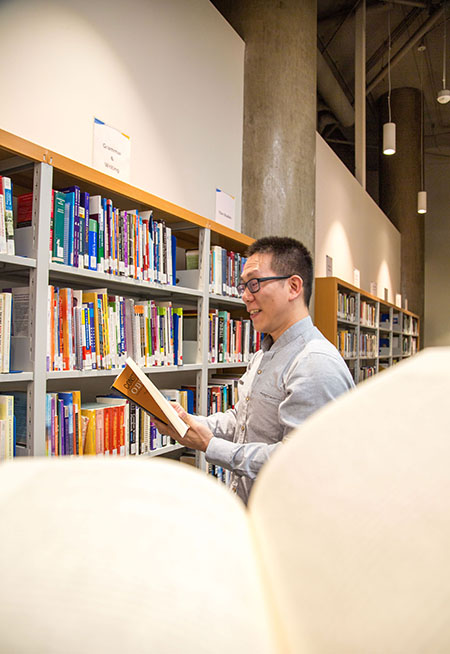
Q. Is there anything else you want readers to know about you or just life in general?
I would like to say on the record that I appreciate this project and I hope more faculty can come out of it because that’s the only way we can learn about each other. I really think this is a good idea and I’m very happy to be part of it.
Life advice. I have already given some. Let’s say there is past, present and future and how far we can look in any direction, including the present.
Present tends to be like a magnifying glass. Your reaction is like, right now, what am I going to do? It tends to be this direction.
People looking in the past is to the extent of their memory, right? And how much they’re even willing to remember because there are things that we do remember or things that exist.
Are we willing to look at it? Are we willing to remember it? Are we willing to learn from it? So there’s a lot of things. “Can we?” and “Will we?” those are two questions I would ask in that direction.
The future is almost “How far?” and “How much?” How much do we want to know? How far are we willing to go?

What does that mean? Well, there are scientists that try to look at, as an example, climate change. They see in the past based on the past data, they look at the present.
Now they decide: are we going to ban plastics because it’s going to help the environment and help our next generation?
Well, that comes from this, right? How much we want to know about it to influence our decisions. And how far do we want to go with that decision.
For example, banning straws? Probably a good idea because it’s less plastic in the sea. Take that into a personal decision like, okay, I’m choosing this college, or I’m taking this job.
How much do I want to know? How much do I want for my credential? And how far can it take me? Can it take me all the way up to retirement?
Retirement age is increasing, right? People can not just come out of retirement and do more jobs because they don’t have enough money. There are economic circumstances to that.
These are influences to what we do right now. That’s the kind of life advice I would give.
It’s hard to summarize life in one statement, but it would be good to start with questions. You know, questions drive learning. If you’re not asking a question, you don’t really want to learn something.
Alexander College acknowledges that the land on which we usually gather is the traditional, ancestral and unceded territory of the Coast Salish peoples, including the territories of the xʷməθkwəy̓əm (Musqueam), Skwxwú7mesh (Squamish), and Səl̓ílwətaʔ/Selilwitulh (Tsleil-Waututh) Nations. We are grateful to have the opportunity to work in this territory.
Alexander College acknowledges that the land on which we usually gather is the traditional, ancestral and unceded territory of the Coast Salish peoples, including the territories of the xʷməθkwəy̓əm (Musqueam), Skwxwú7mesh (Squamish), and Səl̓ílwətaʔ/Selilwitulh (Tsleil-Waututh) Nations. We are grateful to have the opportunity to work in this territory.